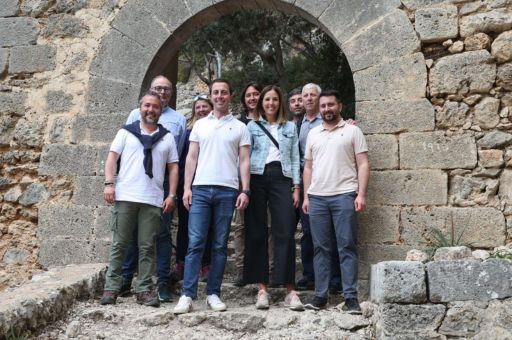The plenary session of the island institution today gave initial approval to the fourth modification of the PTI that regulates photovoltaic parks and includes an additional provision that allows the expropriation of the emblematic monument based on the laws of Territorial Planning and Historical Heritage of the Balearic Islands.
The plenary session of the Consell de Mallorca, chaired by Llorenç Galmés, today gave initial approval to the fourth modification of the Territorial Plan of Mallorca (PTI). This new instrument regulates the implementation of photovoltaic and wind farms and also allows the island institution to take the first step towards expropriating the castle of Alaró and converting it into a supra-municipal facility for historical, archaeological and landscape interpretation.
TDB keeps you informed. Follow us on: Facebook, Twitter and Instagram
The Consell de Mallorca takes the first step towards expropriating the castle of Alaró and creating a historical, archaeological and landscape interpretation facility
The new Territorial Plan includes an additional provision that states: ‘The Alaró castle enclosure, delimited in Annex IX of this Territorial Plan, is classified as a general supramunicipal system on rural land. The purpose of this general system will be to protect the heritage, historical, archaeological, natural and landscape value of the site, and it must be used for the conservation, restoration, interpretation and enjoyment of its values, guaranteeing public access and appropriate management in the general interest by its destination as an asset of cultural interest (BIC)’.
Likewise, section 3 adds: ‘In application of Article 16 of Law 14/2000, on Territorial Planning, the classification as a general system implies the declaration of public utility for the provisions of the legislation on compulsory expropriation; all without prejudice to the possible application to the case of expropriation for social interest provided for in Article 33 of Law 12/1998, of 21 December, on the historical heritage of the Balearic Islands’.
The councillor for Territorial Planning, Fernando Rubio, explained that ‘today we are taking the first step towards making the castle of Alaró the property of all Mallorcans, including in the modification of the PTI that we have just approved the possibility of acquiring an emblematic monument for Mallorca, which is in danger of degradation’. Rubio remarked that the Consell ‘will do what it is allowed to do, both by the Law of Territorial Planning and the Law of Historical Heritage and always with the endorsement and reports of the institution’s technicians, to convert the castle of Alaró into a supra-municipal facility for historical, archaeological and landscape interpretation for all Mallorcans’.
Photovoltaic panels and correction of errors in modification 3
On the other hand, the zoning of the places where photovoltaic parks of up to four hectares can be installed on rural land has also been approved today, as required by the Law on climate change. A modification that was not approved at the end of the last legislature and which is now more restrictive, reducing some 9,700 hectares. The plots that receive aid from the Common Agricultural Policy (CAP) are eliminated and landscape criteria are established to minimise the impact. Photovoltaic parks are not allowed in the Tramuntana mountain range or in protected areas.
Specifically, the zoning plan drawn up during the last legislature, which was not approved, envisaged 26,366 hectares where small parks could be located. The modification approved today by the Consell aims at 16,638 hectares, once the rustic plots that receive subsidies from Europe and the parks installed during this time have been eliminated. Precisely, thanks to the consensus with the Government and the town councils, the aforementioned areas of agricultural activity have been eliminated.
Among the landscape criteria that will be required are a maximum height of 4 metres, locations in areas of lesser slope and 500 metres from urban centres, the obligation of plant barriers for visual protection to reduce the impact and the separation of roads and houses. Priority has been given to areas of low visibility and the use of colours that blend in with the landscape. Storage areas should also be located in areas of urban development and avoid rural land. Evacuation lines must run along roads and public areas.
Likewise, the technical instruction that corrects the 17 errors detected in modification number 3 of the PTI approved during the last legislature has been definitively approved. The technicians of the Consell have found up to 17 errors of great importance that have now been corrected, through the approval of this technical instruction in the Plenary, intending to avoid conflicts of legal and territorial insecurity.
We are talking about errors such as, for example, the fact that the approved PTI does not show on the plans the delimitation of the public maritime land domain of the Costas, the sea shore, nor the traffic easement and the protection of the coast of Mallorca. Other important errors are that the plans approved by the Consell on 11 May 2023 reconvert areas of natural areas of special protection (ANEI), a figure of maximum protection, into common rustic land. They also extend ports such as Alcúdia or modify consolidated urban areas of the urban plans of the municipalities.
